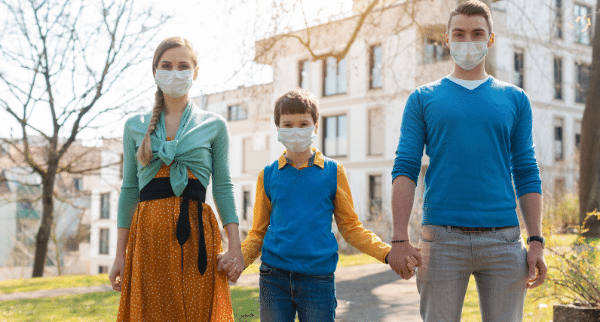In the early days of this COVID 19 Pandemic, some people in the legal profession thought that minor differences between former spouses and partners involved in family law disputes would go by the wayside, and people would focus on the bigger issues facing all of us in society, like our economic and personal survival. I was sadly correct in presuming that this crisis would likely create a little “cottage industry boom” for some family law lawyers to help clients determine how to address time-sharing concerns in these rapidly changing times. After many years of experience, I am confident that we, as a society, still have much to learn on how to resolve disputes on a principled basis and not a positional basis.
A few weeks ago, when the government decided to impose strict measures to help stop the spread of the COVID 19 virus, the Ministry of the Attorney General and the leading justices of the provincial court systems in Ontario responded by shutting down the court systems for all but “emergency matters.” They are to be lauded for doing so. However, many family law lawyers jumped all over the word “emergency.” It was not defined. As we know, what is an emergency for one person is not an emergency for another (just ask any 9-1-1 phone operator to tell you stories of so-called “emergency calls” that they get). The same can be said in family law.
Over the past week or so, a few cases have been heard, and decisions made as to what is and is not an emergency in family law matters. Like any case, the facts will usually dictate whether the case is likely to be deemed an emergency (e.g., a child is at serious risk of being abducted or physically harmed, etc.), and what is not likely to be deemed an emergency (e.g., looking to expand access, looking to increase child or spousal support, etc.). In the COVID 19 reality we now live in, if a child is being withheld from the other parent due to COVID 19 concerns, the risk needs to be real and clear, and there needs to be evidence that a parent is not doing anything about the exposure of risk to the child. Absent that, the simple fear that the regular access exchange would subject a child to COVID 19 is not enough to undo the larger risk to the child of keeping them from their parent, with whom there is an emotional and psychological bond. To paraphrase the words of one judicial decision from last week, a child needs to be assured that they are safe and sound during these turbulent times and to know that their parents will behave in a cooperative, responsible and mature manner.
Once again, the driving factor in any such case involving COVID 19 will be what is best for the child, and not what is best for the parents. I regularly have to remind my family law clients that they do not have the right of access to their child – the right of access belongs to the child and not the parent.
So, as we all work our way through the coming weeks and months to overcome this malady, I would remind all family law clients to heed the words of Rodney King when he said, “Can’t we all just get along?” or, on a much lighter note, Helen Lovejoy (from The Simpsons) when she begged us all: “Can’t we please just think of the children?”In the early days of this COVID 19 Pandemic, some people in the legal profession thought that minor differences between former spouses and partners involved in family law disputes would go by the wayside, and people would focus on the bigger issues facing all of us in society, like our economic and personal survival. I was sadly correct in presuming that this crisis would likely create a little “cottage industry boom” for some family law lawyers to help clients determine how to address time-sharing concerns in these rapidly changing times. After many years of experience, I am confident that we, as a society, still have much to learn on how to resolve disputes on a principled basis and not a positional basis.
A few weeks ago, when the government decided to impose strict measures to help stop the spread of the COVID 19 virus, the Ministry of the Attorney General and the leading justices of the provincial court systems in Ontario responded by shutting down the court systems for all but “emergency matters.” They are to be lauded for doing so. However, many family law lawyers jumped all over the word “emergency.” It was not defined. As we know, what is an emergency for one person is not an emergency for another (just ask any 9-1-1 phone operator to tell you stories of so-called “emergency calls” that they get). The same can be said in family law.
Over the past week or so, a few cases have been heard, and decisions made as to what is and is not an emergency in family law matters. Like any case, the facts will usually dictate whether the case is likely to be deemed an emergency (e.g., a child is at serious risk of being abducted or physically harmed, etc.), and what is not likely to be deemed an emergency (e.g., looking to expand access, looking to increase child or spousal support, etc.). In the COVID 19 reality we now live in, if a child is being withheld from the other parent due to COVID 19 concerns, the risk needs to be real and clear, and there needs to be evidence that a parent is not doing anything about the exposure of risk to the child. Absent that, the simple fear that the regular access exchange would subject a child to COVID 19 is not enough to undo the larger risk to the child of keeping them from their parent, with whom there is an emotional and psychological bond. To paraphrase the words of one judicial decision from last week, a child needs to be assured that they are safe and sound during these turbulent times and to know that their parents will behave in a cooperative, responsible and mature manner.
Once again, the driving factor in any such case involving COVID 19 will be what is best for the child, and not what is best for the parents. I regularly have to remind my family law clients that they do not have the right of access to their child – the right of access belongs to the child and not the parent.
So, as we all work our way through the coming weeks and months to overcome this malady, I would remind all family law clients to heed the words of Rodney King when he said, “Can’t we all just get along?” or, on a much lighter note, Helen Lovejoy (from The Simpsons) when she begged us all: “Can’t we please just think of the children?”

